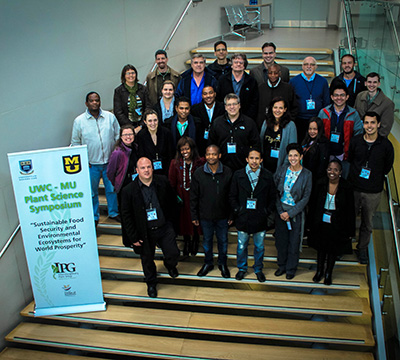University of Missouri and University of Western Cape Plant Science Symposium

The symposium, organized as a joint venture between the University of Missouri (MU) and the University of Western Cape (UWC) was held at University of Western Cape from June 15 - 18, 2015. The goal of the symposium was to further advance the long-standing academic exchange program between MU and UWC and brought together plant scientists with research interests in plant abiotic and biotic stresses and their impact on food security and environmental sustainability. The symposium also sought to promote interactions between MU/UWC and the University of Pretoria, the University of Cape Town, and Stellenbosch University in areas of research that relate to the activities of the South African Department of Science and Technology-National Research Foundation Center of Excellence in Food Security (CoE-FS; ), which is headquartered at UWC and generously co-sponsored the symposium.
“The joint symposium provided an outstanding opportunity to link up with colleagues in South Africa, and to put our minds together and make more rapid progress in these critical areas of global concern” said Dr. Bob Sharp, IPG’s Director.
Presenting plant science knowledge against the backdrop of food security is also in keeping with the interests of the CoE-FS - a virtual center that aims to undertake research, build capacity, and kick-start activities that would promote a sustainable food system.
“It was a chance to bring together people in these highly specialized fields in one place to talk about what is a very important topic,” said Prof. Julian May, the Center’s Director. “International partnerships are important to what we’re trying to do in the Centre; they allow us to access resources that are not necessarily available to South Africans.”
The symposium developed from interactions between Ndiko Ludidi, Associate Professor and Deputy Head of the Department of Biotechnology, and also group leader of the Plant Biotechnology Research Group at UWC, and Sharp, Zhanyuan Zhang and Mel Oliver at MU. The interaction started in 2014 when Dr. Ludidi visited MU on a University of Missouri South African Education Program (UMSAEP) award to develop collaborations in the area of plant responses to drought.
Enhancing interactions with the CoE-FS will be beneficial for developing multi-disciplinary approaches to the complex biological, social and economic issues involved in food security concerns. Another exciting idea, proposed by the graduate student and postdoc participants of the symposium, is the possibility of developing a program to place interested young MU scientists in research groups in South Africa to provide an invaluable experience for orienting their future work on agricultural issues.
“Many young MU scientists are interested in enhancing their knowledge of topics such as technology transfer and field applications for the type of basic research that we work on”, said Isaiah Taylor and Amanda Durbak.
Additionally, hosting students and postdocs from UWC or other institutions in IPG labs would benefit the programs in South Africa because of MU’s strength in fundamental plant biology and its established program of scholarly and professional development for young scientists, such as regular visits by top scientists, and a student and postdoc centered seminar series.
A total of twelve participants from MU, including two graduate students and one postdoc, attended the symposium. Generous co-sponsorship was provided by MU Interim Chancellor Hank Foley and Deans Tom Payne (College of Agriculture, Food and Natural Resources) and Mike O'Brien (College of Arts and Science) and the South African Department of Science and Technology-National Research Foundation Center of Excellence in Food Security.